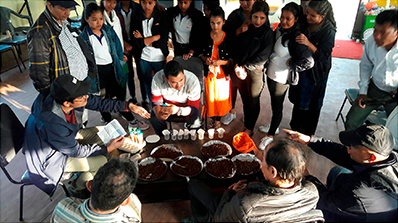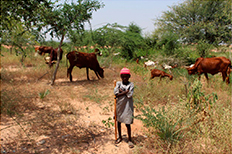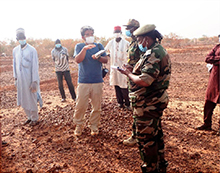(3) Cooperation with Japanese NGOs
Japanese NGOs implement development cooperation activities that directly benefit local residents in various fields in developing countries and regions. Even in sites affected by conflict or natural disasters, such as earthquakes and typhoons, they provide prompt and effective emergency humanitarian assistance. NGOs are attuned to different local situations in developing countries and are capable of carefully tailoring responses to the needs of the local people. Accordingly, NGOs can well provide assistance at the grassroots level, which can be hard-to-reach through the support of the government and international organizations. The Government of Japan positions Japanese NGOs that carry out activities, which represent the “visibility of development cooperation,” as indispensable partners in development cooperation. It thus promotes collaboration with the NGOs through the three pillars of assistance: financial cooperation for NGOs’ projects, support to capacity building of NGOs, and dialogues with NGOs (see also the MOFA website Note 10 for more information on international cooperation and NGOs).
A. Financial Cooperation for NGOs’ Projects
The Government of Japan cooperates in various ways to help Japanese NGOs to smoothly and effectively implement development cooperation and emergency humanitarian assistance projects in developing countries and regions.
■ Grant Assistance for Japanese NGO Projects
The Government of Japan provides financial support for the socio-economic development projects that Japanese NGOs implement in developing countries through the Grant Assistance for Japanese NGO Projects. The grant covers a wide range of fields, such as health, medical care and sanitation, rural development, assistance for persons with disabilities, education, disaster risk reduction, and landmine and unexploded ordnance (UXO) disposal. In FY2021, 51 Japanese NGOs utilized this grant to implement 96 projects in 35 countries and 1 region, amounting to approximately 5.7 billion yen (see also “Project Introduction Column”).
■ Japan Platform (JPF)

A local employee of NPO Love Green Japan explaining soil testing in Panchkhal City, Nepal (JICA Partnership Program)
Japan Platform (JPF) Glossary supports and coordinates emergency humanitarian aid activities of NGOs in cooperation with Japanese NGOs, the business community, and the government. In FY2021, JPF implemented 94 projects under 20 programs, including Response to Iraq and Syria Humanitarian Crisis, Response to Afghanistan Humanitarian Crisis, Myanmar Displaced Persons Humanitarian Assistance, Humanitarian Assistance of Palestine/Gaza, Humanitarian Response to South Sudan Conflict, Humanitarian Response to Ethiopia Conflict, COVID-19 Emergency Response, Support for Victims of Cyclone Seroja, and Support for Victims of Typhoon Rai in the Philippines (see Part I for assistance related to Ukraine). As of December 2022, JPF has 45 member NGOs (see also “Project Introduction Column”).
Niger
Cleaning Cities, Greening the Land, and Enriching Lives
Greening Activities with Organic Garbage in the Metropolitan Area of Niamey, Republic of Niger
JICA Partnership Program (Support Type) (September 2021 – September 2024)
In Niger, which is located on the southern edge of the Sahara Desert, desertification that devastates the land is severe, causing a decline in the production of agricultural and livestock products. It is a serious problem that leads directly to hunger and poverty for many citizens in Niger because more than 80% of the population is engaged in agriculture and livestock farming.
For the past 20 years, Professor OYAMA Shuichi of Kyoto University has been working with the Ministry of Environment and Anti-desertification of Niger and the local people to combat desertification and solve the problems of hunger and poverty. Based on a greening model backed by Dr. Oyama’s many years of research, this project carries out activities for greening degraded land using sorted and collected urban household waste. By dumping urban organic waste into degraded land, the sand that is blown in by monsoons accumulates and termite activity increases, both of which improve the soil. Plastic bags mixed into waste act as plastic sheets for agriculture, preventing the evaporation of precious moisture in arid regions and helping plants grow.
So far, 36 blocks (21 hectares) of degraded land have been developed into grazing land, fields, and forests according to the wishes of the citizens. The increase in livestock grazing land and crop arable land has created jobs and led to cash income for citizens, and the expansion of green spaces has reduced conflicts between farmers and herders.
This project contributes to resolving various issues such as preventing desertification by greening degraded land, resolving urban waste problems, reducing poverty among local people, and bringing regional peace and stability.

A boy on summer vacation taking care of livestock on a new pasture that was once degraded land (Photo: OYAMA Shuichi)

Dr. Oyama explaining the greening mechanism using urban waste to officials of the Ministry of Environment and Anti-desertification of Niger (Photo: JICA)
■ NGO Project Subsidies
NGO Project Subsidies is another form of financial support provided by the Government of Japan to Japanese NGOs. Three types of projects supported by the subsidies are; “research projects” that identify and formulate development cooperation projects and conduct post-project evaluations, “international cooperation-related projects in Japan” and “international cooperation-related projects based overseas,” which support holding and/or participating in training sessions and lectures in Japan and abroad with the aim of helping applicant NGOs expand and deepen their international cooperation activities. In FY2021, the Government of Japan provided NGO Project Subsidies to six Japanese NGOs, and supported project formulation surveys, conducting post-project evaluations, and holding/participating in seminars and workshops including those held online, in Japan or abroad.
■ JICA Partnership Program (JPP)
JICA Partnership Program (JPP) is a joint effort between JICA and Japanese NGO/Civil Society Organizations (CSOs), local public entities, universities, private companies, and other organizations to meet the diverse needs of developing countries. Applicant organizations propose international cooperation projects based on their accumulated knowledge and experience, while JICA commissions the project implementation to the applicant organizations (see the JICA website Note 11 for information on program details among others). Through JPP, approximately 200 projects are implemented every year. The number of the countries implementing JPP has reached a cumulative total of approximately 90 (see also “Project Introduction Column”).
B. Support to Capacity Building of NGOs
In response to the growing importance of activities by non-governmental actors and the use of private funding in international cooperation, MOFA carries out the following programs with the objective of further strengthening the organizational structures and project implementation capabilities of Japanese NGOs and developing their human resources.
■ NGO Consultant Scheme
Under this scheme, MOFA commissions highly experienced Japanese NGOs (15 organizations in FY2021) to address inquiries and respond to requests for consultation from citizens and NGOs on such topics as international cooperation activities by NGOs, how to establish an NGO, organizational management and operation, and approaches for providing development education.
■ NGO Internship Program/NGO Study Program
MOFA implements the NGO Internship Program and NGO Study Program with the objective of strengthening the organization through human resources development. The NGO Internship Program aims to develop human resources of the younger generation, who can play an active role in Japanese NGOs for international cooperation in the future. A total of seven interns were accepted by NGOs through this program in FY2021.
Under the NGO Study Program, mid-career personnel from Japanese NGOs for international cooperation undergo domestic and overseas training and widely share the fruits of their training within their organization and with other NGOs, with the aim of contributing to enhancing the capabilities of Japanese NGOs as a whole. In FY2021, four people received training through this program.
■ NGO Study Group
The NGO Study Group hosted by MOFA aims to strengthen NGOs and their capacities. Appointed by MOFA, study groups organized by members of Japanese NGOs who are interested in some specific themes faced by NGOs conduct joint studies and research, seminars, workshops, symposiums, and other activities, and produce reports and recommend specific measures for improvement. In FY2021, the NGO Study Group activities were conducted on the following two themes: (i) “Study and Analysis of Global Trends in ‘Localization’ in International Cooperation and Examination of Issues and Possibilities for Promoting this Theme at Japanese International Cooperation NGOs,” and (ii) “Study and Research on Respect for Human Rights and Measures to Strengthen Capacity at NGOs in the Era of the SDGs.” The reports and outcomes of these activities are available on the MOFA website Note 12 (in Japanese only).
C. Dialogue with NGOs (NGO-Ministry of Foreign Affairs Regular Consultation Meetings and NGO-JICA Consultation Meeting)
The General Meeting of the NGO-Ministry of Foreign Affairs Regular Consultation Meeting Glossary was not held in FY2021 due to the impact of COVID-19. However, a subcommittee meeting, namely the “Partnership Promotion Committee,” was held twice in August 2021 and January 2022, and the “ODA Policy Council,” was held once in March 2022 (see the MOFA website Note 13 for more information on the NGO-Ministry of Foreign Affairs Regular Consultation Meeting, meeting minutes, and other details).
JICA holds the NGO-JICA Consultation Meeting to promote dialogue and collaboration between NGOs and JICA. Two meetings were held online in FY2021, with participation of 36 organizations in the first meeting and 94 organizations in the second meeting (see the JICA website Note 14 for more information on the NGO-JICA Consultation Meeting, meeting minutes, and other details).
- Note 10: https://www.mofa.go.jp/policy/oda/page_000025.html
- Note 11: https://www.jica.go.jp/english/our_work/types_of_assistance/citizen/partner.html
- Note 12: https://www.mofa.go.jp/mofaj/gaiko/oda/shimin/oda_ngo/houkokusho/kenkyukai.html (in Japanese only)
- Note 13: https://www.mofa.go.jp/mofaj/gaiko/oda/shimin/oda_ngo/taiwa/kyougikai.html (in Japanese only)
- Note 14: https://www.jica.go.jp/partner/ngo_meeting/index.html (in Japanese only)
